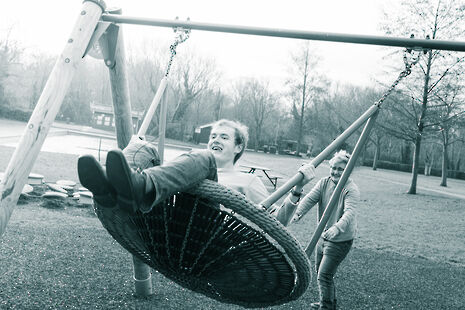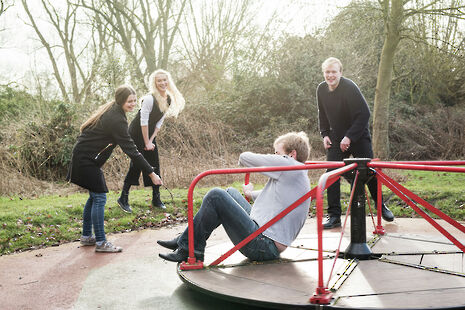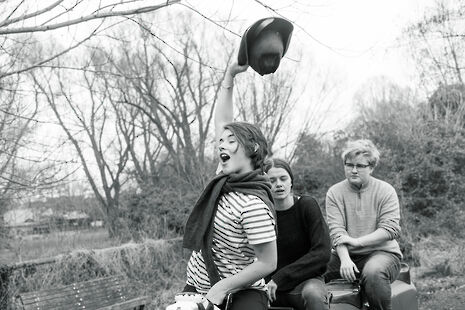The ‘Adult world writ large’: Misplaced Nostalgia in Blue Remembered Hills
Sian Bradshaw sits down with director, Zoé Barnes about the creative process behind Week 6 drama, Blue Remembered Hills and the intricacies of capturing childhood experience

"When we dream of childhood," said Dennis Potter, "we take our present selves with us. It is not the adult world writ small; childhood is the adult world writ large." Like Potter, who viewed childhood as "adult society without all the conventions and the polite forms which overlay it,” director, Zoé Barnes has embraced this notion with open arms.
Blue Remembered Hills is a naturalistic and nostalgic drama that sees actors on the cusp of adulthood cast in children's roles, culminating in tragedy. On a sunny, summer afternoon in bucolic England of 1943, seven West Country children play in the Forest of Dean. The children may be couched from the dangers of World War II, yet still, it works its way into the fabric of the play and is a framework that looms large in their imaginations, reflecting in their games and spontaneous actions. But no adults are present to intrude - the forest is their playground.
And as I talk to Barnes, it is clear that the production bids to draw upon the representation of childhood experience organically, capturing the apparent simplicity of youth by the means of mimesis and a cultivated spontaneity. “It’s really a play about how we consider childhood experience. I mean, the search history on my computer is very strange. It’s full of videos of children playing, so I’ve been sending those to the cast and telling them: ‘Watch this child playing!’ I’ve really been encouraging them to bring their performance from the inside. I’ve been encouraging them [the cast] to build up a tension.”

Barnes tells me that rehearsals have been a process of re-learning. Not a case of acting, but re-acting. “We’ve done rehearsals with a long build-up of improv, where actors are building forts, and what they’re doing by building these forts and re-acting to each other in character is achieving a spontaneity. Their mind is so occupied with the very act of building it that they’re so uninhibited. We’ve slowly enveloped this into the way we’re acting.”
And to this end, there is a definite focus on achieving a total lack of inhibition among the cast. “Thinking can kill a performance,” Barnes adds. Quite right, too. And so the play has been rehearsed with very little blocking, as Barnes puts it – “just simple blocking so that the actors have an awareness of the general area that they’re supposed to be in”.
"Barnes has opted to take all of the wings away, utilising every entrance and door of the auditorium, creating a sprawling and expansive space in which the cast can run around"
It sounds like it has been an interesting creative process to say the very least. Barnes reveals that she “hasn’t had a single rehearsal where somebody hasn’t injured themselves,” and she isn't wrong. By the sides of the ADC stage, there are various accident reports documenting every bruised knee and grazed elbow inflicted upon members of the cast, but of course, this comes naturally. It recalls the inevitable calamities that come with playing as a child.
Barnes has even moved the rehearsal room to the playground in her bid to capture the reckless abandon and childlike honesty that Potter’s text implores. “With a play like this, it has to feel organic. It has to feel like that if the characters want to, they can just run around. And it’s been so much fun doing that, though we do have to stay on watch. We’re always shouting to each other: ‘There’s a child! move to the other playground!’”

To this end, the decision to open up the theatrical space of the ADC stage is pertinent. Barnes has opted to take all of the wings away, utilising every entrance and door of the auditorium, creating a sprawling and expansive space in which the cast can run around. "I want to capture the sense that there are children popping up from everywhere, the idea that children don’t just walk through a door, they see a window and think: ‘Ooh, yeah, I’m going to climb in through the window!’ and it obviously in many ways, is not a naturalistic presentation, but it is quite symbolic. It represents that they’re in this forest, and it’s like a playground."
And the Housman aches on in the background. The play promises to explore the supposed virtues of childhood, which are, as Potter put it, "but the opacities of the very anxieties and aggressions which we occasionally seek to evade by means of a misplaced nostalgia for those Blue Remembered Hills"
 News / Uni members slam ‘totalitarian’ recommendation to stop vet course 15 January 2026
News / Uni members slam ‘totalitarian’ recommendation to stop vet course 15 January 2026 Science / Why smart students keep failing to quit smoking15 January 2026
Science / Why smart students keep failing to quit smoking15 January 2026 News / Cambridge bus strikes continue into new year16 January 2026
News / Cambridge bus strikes continue into new year16 January 2026 Interviews / The Cambridge Cupid: what’s the secret to a great date?14 January 2026
Interviews / The Cambridge Cupid: what’s the secret to a great date?14 January 2026 Comment / Will the town and gown divide ever truly be resolved?12 January 2026
Comment / Will the town and gown divide ever truly be resolved?12 January 2026








